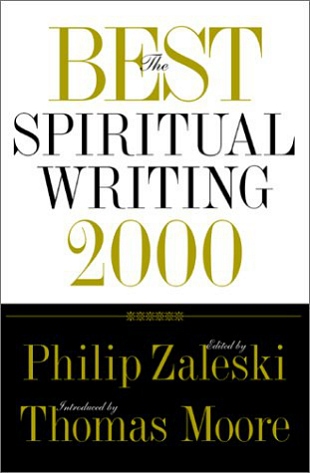In his top-drawer introduction to this third annual installment of the best spiritual writings, Thomas Moore observes, "The old theologians said that the task of spirit is to feed the soul and to keep it seeded and alive. Spiritual reading does this by lulling us into reverie and by enticing us to live momentarily at least in a multidimensional world of nuance and resonance." Here are essays and poems that traverse the private and public worlds of our time, challenging us to see more clearly and to love more dearly.
I was especially drawn to pieces by Wendell Berry and Bill McGibben. The first reveals how destructive consumerism is to cultures and communities, while the second explores the relevance of Gandhi's practice of renunciation as an alternative to unbridled greed as America's one true creed. The link between spirituality and politics is at the core of the Great Work of our time. Harvey Cox chimes in on the same wavelength with his hard-hitting essay "The Market as God."
I enjoyed Gretel Ehrlich's pilgrimage jaunt with St. Francis of Assisi and was impressed with the imaginative sweep of Annie Dillard's "Holy Sparks: A Prayer for the Silent God." Linda Hogan provides a few new twists on the theme of soul sickness, and Roger Shattuck hits the nail on the head in his essay "When Evil Is 'Cool'."
Perhaps my personal favorite is William H. Gass's "In Defense of the Book" where he writes: "In the ideal logotopia, every person would possess his own library and add at least weekly if not daily to it. The walls of each home would seem made of books; wherever one looked one would only see spines; because every real book (as opposed to dictionaries, almanacs, and other compilations) is a mind, an imagination, a consciousness. Together they compose a civilization, or even several." A perfect description of our loft and what it feels like to live in a library.
